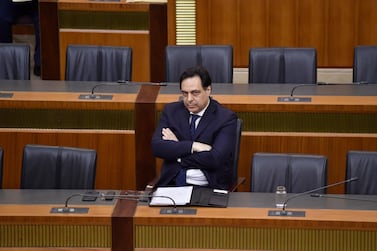The governor of Lebanon's central bank said that $1 billion (Dh3.67bn) had been transferred out of the country, despite tight restrictions on withdrawals as the protest-hit country faces a liquidity crisis.
Riad Salameh's comments came amid suspicions of politically motivated capital flight that are the subject of a probe launched late December.
"Of the $1.6bn that was withdrawn (from the Lebanese banking sector) between October 17 and the end of the year... $1bn were transferred abroad by Lebanese," Mr Salameh said in an interview with the France 24 news channel on Thursday.
Since October 17, Lebanon has been rocked by an unprecedented protest movement against an entrenched political class seen as corrupt and incompetent.
The protests coincided with an increasingly crippling shortage of dollars, prompting banks to impose tight restrictions on withdrawals and transfers overseas.
Protesters have accused bankers of complicity with the political class and suspect politicians of transferring funds abroad despite the restrictions and a prolonged local bank closure when protests first broke out.
Mr Salameh said the central bank's investigation "would focus on the $1bn", but that it would "take some time".
The other $600,000 that were taken out of Lebanese banks during the period in question were capital deposits held by foreign banks, he added.
He noted there had been reports of "politicians, senior civil servants and bank owners" involved in capital flight, but said a probe is necessary to identify those responsible.
A report by the Carnegie think tank in November said that nearly $800 million left Lebanon between October 15 and November 7, when most citizens could not access their funds because banks were closed due to protests.
Mr Salameh on Thursday played up the country's monetary stability, despite the Lebanese pound losing more than a third of its value against the dollar on the parallel market in recent weeks.
"The rate will stay" the same, he said, referring to the peg of 1507.5 pounds against the dollar.







